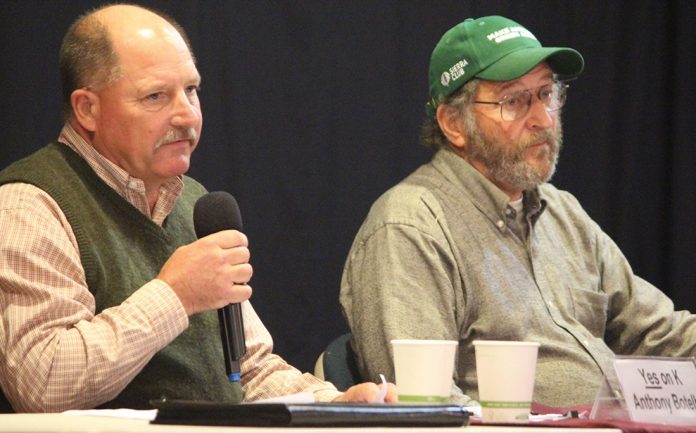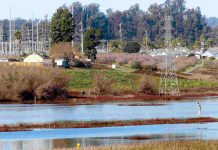
By ERIK CHALHOUB, special to the Pajaronian
AROMAS—With San Benito County officials eyeing potential development along Highway 101 as a way to capture much-needed sales tax revenue, many residents feel it would further impact traffic, water and other issues in the county.
Such is the debate surrounding Measure K, which, if passed by voters in the March election, would adopt an ordinance approved by the county supervisors in September that converts four properties along the highway to regional commercial zoning.
About 50 people gathered in the Aromas Community Grange Jan. 19 to hear a debate on the measure and ask questions to the two presenters: San Benito County Supervisor Anthony Botelho, who supports the measure, and Andy Hsia-Coron of Preserve Our Rural Communities, who opposes Measure K.
The forum, hosted by the grange and the League of Women Voters, also included a question-and-answer session with the candidates running for the District 2 seat on the San Benito County Board of Supervisors: Valerie Egland, John Freeman, Kollin Kosmicki and Wayne Norton. Candidate Frank Barragan was unable to attend.
The San Benito County Supervisors approved zoning changes recommended by the 2035 General Plan on Sept. 24, known as Ordinance No. 991. But a successful signature-gathering campaign by opponents halted the ordinance’s implementation, putting the question on the March ballot.
The four interchanges outlined in the ordinance are the Betabel Road and Highway 129/Searle Road interchanges in San Juan Bautista, and the Rocks Ranch and 101 Livestock Market interchanges in Aromas. The four properties, totaling about 326 acres, would be converted to regional commercial zoning, which according to the 2035 General Plan approved in 2015, provides “areas that function as destinations for commercial activity serving the regional population.”
The types of developments allowed are shopping centers, automobile stations and hotels. Under regional commercial zoning, retail space is limited to 85,000 square feet per property.
Opponents of the zoning change say development along Highway 101 would add more traffic in the already-congested area, which Botelho disputed. He said the development would instead encourage commuters to get off the highway, alleviating traffic.
“Measure K is not about traffic,” Botelho said. “I don’t believe for one minute that any of these commercial areas will add traffic.”
Hsia-Coron pointed to language in the ordinance that allows up to 30 residential units to be built on each property, as well as 125 hotel rooms, as factors in increasing traffic.
“Every day there is a traffic jam on Highway 101,” he said. “To say this won’t have an impact, go look at Prunedale, see where people merge on and off the highway.”
He said development along the “nodes,” as the properties are referred to, would also negatively impact the over-drafted Aromas aquifer, as well as wildlife and Amah Mutsun land.
“None of these have been adequately addressed,” Hsia-Coron said.
Botelho said the ordinance requires developers to show proof of a sustainable water source, part of a strict ordinance that requires a “very extensive public review process” for any proposals.
No project applications have yet to be submitted to the county, according to Botelho.
“We can have a business center, we can have stores that sell our local products,” he said. “We could have some gas stations, so we can generate sales tax to fix the roads.
“The county absolutely needs this tax revenue.”
Hsia-Coron said the defeat of Measure K could urge the county to remove the nodes from the General Plan.
The issue of the nodes could play a role in the District 2 election, as all of the properties fall within the district. All candidates during the Jan. 19 forum expressed support for the ordinance, except for Kosmicki, who opposes the development.
FINANCIALS
According to forms filed with the San Benito County Elections Department, the Yes on K committee reported a $22,000 contribution on Jan. 16 from the “Bingaman Irrevocable a Trust #1,” which owns the Rocks Ranch property.
It also received $11,000 each from attorneys Gregory N. Weiler and Mark Johnson on Jan. 6.
No contributions or expenditures were reported from July 1 to Dec. 31.
The committee, which lists Guadalupe Rangel of Hollister as treasurer, recently announced it had received the endorsement of both the San Benito County Democratic and Republican parties.
Preserve Our Rural Communities, which is listed as the opposing committee to Measure K, received $15,882 in contributions from Jan. 1 to Dec. 31. Contributions ranged from $100 to $1,000 from various individuals.
Aromas residents Ruth Snow, Gina Paolini and Mary Hsia-Coron—who is listed as the principal officer—were among those who donated $1,000.
From July 1 to Dec. 31, the group spent $15,821.10, according to filings. About half that amount—$8,144.66—went to San Francisco-based law firm M.R. Wolfe & Associates for legal services. Preserve Our Rural Communities is currently in litigation with the county over the Highway 101 rezoning decision.
Preserve Our Rural Communities held an event at the VFW Hall in San Juan Bautista on Jan. 22, where retired Congressman Sam Farr, Valentin Lopez, chairperson of the Amah Mutsun Tribal Band, and others were scheduled to speak against Measure K.












